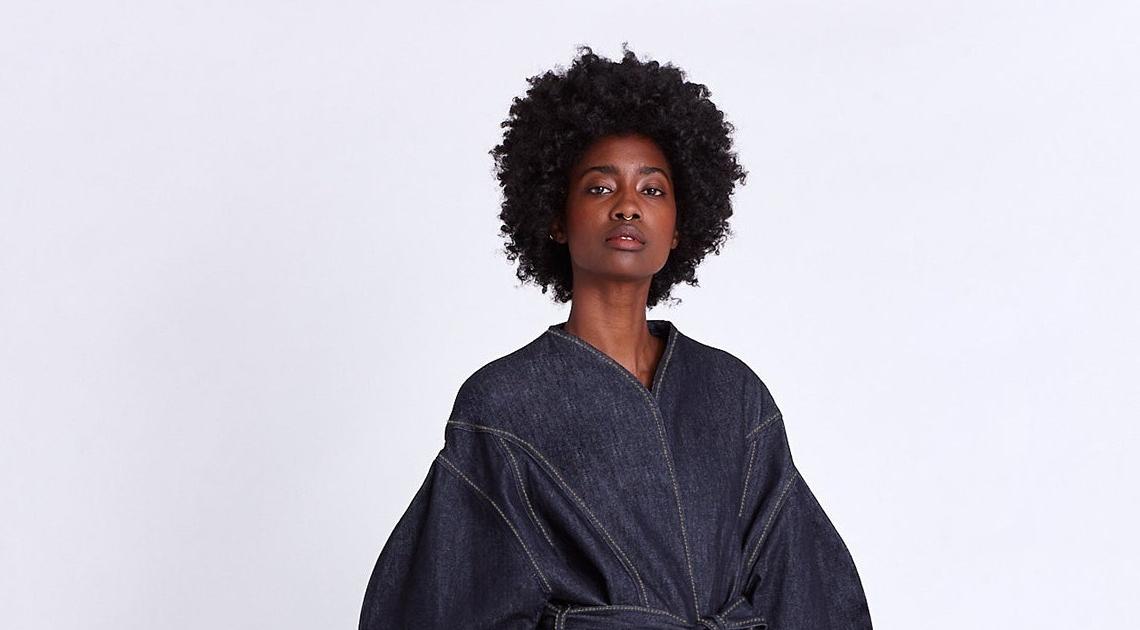They are fourteen to draw for Asantii.
Stylists who come from DRC, Angola, Ethiopia, Ghana, Ivory Coast, Kenya, Morocco, Nigeria, Rwanda, Senegal, South Africa and Tanzania.
The idea of collaborating with a new pan-African brand makes them enthusiastic.
For good reason: the project is unique.
Unveiled in early August - first in London (where the creative studio is overseen by a product development team with experience in major luxury groups, led by Vanessa Anglin, former head of Burberry), then in Kigali - it aims to present two collections a year.
For all and for a long time
There are timeless basics sold between 50 and 300 euros, which do not respond to the phenomenon of seasonality very present in the fashion industry.
"We are taking the opposite path to that of fast fashion, we want to be able to sell our clothes at any time of the year", explains the founder Maryse Mbonyumutwa.
This gives wide jeans in raw denim, many shirts worked in volumes and details (ruffles, gathers, ties, embroidery...), some denim jackets, long and short, cut in large widths, as well as long tunics.
With Asantii, I want to show that African fashion goes far beyond wax.
We want to avoid the community label and move towards an international scope.
Maryse Mbonyumutwa, founder
The pieces offered are intended to speak to the greatest number of people and are, for the most part, made from materials sourced in Africa (Egyptian cotton, leather, raffia, etc.).
“With Asantii, I want to show that African fashion goes far beyond wax.
We want to avoid the community label and move towards an international scope.
When I worked in textiles in China, we had many foreign brands to produce, but I never had in hand the technical file of a label that came from Africa.
With Asantii, I want to rectify the situation”, continues Maryse Mbonyumutwa.
Full screen
The shirts are worked in volumes and details.
Asantii
Rwanda, a new place for fashion
The Rwandan entrepreneur, who has partnered with the Chinese group C&D and Vanessa Anglin, has been working on her project for three years, with desire and great ambitions.
She has spent twenty-three years in the textile industry exploring all the links in the chain in Chinese factories, but also those in Bangladesh, India and more recently Ethiopia, which has acquired a gigantic industrial area, but where small hands are the cheapest on the planet.
The experience and the network have enabled her to grasp the failings, which has given her a thirst for opportunities.
Like the launch of a large-scale production site in Rwanda in 2019, a country hitherto little exploited by the textile industry.
After having benefited from a boost from the State, it managed to create 4300 jobs accompanied by a societal project (fair wages, crèche available to employees' children, free meals, distribution of sanitary napkins, etc.) .
The factory first responds to a production logic for foreign brands.
The Asantii project was then nested in the machine with great freedom.
“The advantage of having our own infrastructure is that we always start with small quantities, which helps to avoid waste, specifies the entrepreneur.
By going to produce elsewhere, we should have complied with a minimum quota.
Full screen
XXL denim at Asantii.
Asantii
Fight against the second hand
The textile that arrives in Africa looks more and more like waste.
With the advent of vintage, we sort more and the beautiful pieces stay in Europe.
Maryse Mbonyumutwa, founder of the Asantii project
All these actions are also a way to do battle with second-hand clothing, seen as unfair competition.
The massive imports of second-hand clothing into Africa create economic opportunities, but are also seen as an obstacle to the development of a real textile industry.
In Rwanda, the government has been overtaxing second-hand clothes since 2016 with the aim of phasing them out of the market.
“The second hand is a fight.
Unfortunately, the textile that arrives here is more and more akin to waste.
With the advent of vintage, we sort more and the beautiful pieces stay in Europe.
Only 30% of imported clothes go to market, the rest ends up in the trash,” laments Maryse Mbonyumutwa.
Wishing to promote African creation, the Rwandan also makes her factory available to her collective of creators for their own brand.
Like an incubator, it offers them suitable production, ideal for any young brand starting out.
And a way for her to retain young talent.
Who knows, maybe they will be his best customers.
A bet on the future where everyone wins.

